Chapter 1. Market Scope & Methodology
1.1 Market Definition
1.2 Objectives
1.3 Market Scope
1.4 Segmentation
1.4.1 North America Affective Computing Market, by Component
1.4.2 North America Affective Computing Market, by Technology
1.4.3 North America Affective Computing Market, by End User
1.4.4 North America Affective Computing Market, by Country
1.5 Methodology for the research
Chapter 2. Market Overview
2.1 Introduction
2.1.1 Overview
2.1.2 Executive Summary
2.1.3 Market Composition and Scenario
2.2 Key Factors Impacting the Market
2.2.1 Market Drivers
2.2.2 Market Restraints
Chapter 3. Competition Analysis - Global
3.1 KBV Cardinal Matrix
3.2 Recent Industry Wide Strategic Developments
3.2.1 Partnerships, Collaborations and Agreements
3.2.2 Product Launches and Product Expansions
3.2.3 Mergers & Acquisitions
3.3 Top Winning Strategies
3.3.1 Key Leading Strategies: Percentage Distribution (2016-2020)
3.3.2 Key Strategic Move: (Partnerships, Collaborations, and Agreements : 2016, May – 2020, Jun) Leading Players
Chapter 4. North America Affective Computing Market by Component
4.1 North America Affective Computing Software Market by Country
4.2 North America Affective Computing Market by Software Type
4.2.1 North America Speech Recognition Affective Computing Market by Country
4.2.2 North America Enterprise Software Affective Computing Market by Country
4.2.3 North America Face Recognition Affective Computing Market by Country
4.2.4 North America Analytics Software Affective Computing Market by Country
4.2.5 North America Other Software Type Affective Computing Market by Country
4.3 North America Affective Computing Hardware Market by Country
4.4 North America Affective Computing Market by Hardware Type
4.4.1 North America Affective Computing Sensors Market by Country
4.4.2 North America Affective Computing Storage Devices & Processors Market by Country
4.4.3 North America Affective Computing Cameras & Others Market by Country
Chapter 5. North America Affective Computing Market by Technology
5.1 North America Touch Based Affective Computing Market by Country
5.1.1 North America Touchless Affective Computing Market by Country
Chapter 6. North America Affective Computing Market by End Use
6.1 North America Healthcare Affective Computing Market by Country
6.2 North America Media & Entertainment Affective Computing Market by Country
6.3 North America BFSI Affective Computing Market by Country
6.4 North America Automotive Affective Computing Market by Country
6.5 North America IT & Telecom Affective Computing Market by Country
6.6 North America Retail & E-commerce Affective Computing Market by Country
6.7 North America Others Affective Computing Market by Country
Chapter 7. North America Affective Computing Market by Country
7.1 US Affective Computing Market
7.1.1 US Affective Computing Market by Component
7.1.1.1 US Affective Computing Market by Software Type
7.1.1.2 US Affective Computing Market by Hardware Type
7.1.2 US Affective Computing Market by Technology
7.1.3 US Affective Computing Market by End Use
7.2 Canada Affective Computing Market
7.2.1 Canada Affective Computing Market by Component
7.2.1.1 Canada Affective Computing Market by Software Type
7.2.1.2 Canada Affective Computing Market by Hardware Type
7.2.2 Canada Affective Computing Market by Technology
7.2.3 Canada Affective Computing Market by End Use
7.3 Mexico Affective Computing Market
7.3.1 Mexico Affective Computing Market by Component
7.3.1.1 Mexico Affective Computing Market by Software Type
7.3.1.2 Mexico Affective Computing Market by Hardware Type
7.3.2 Mexico Affective Computing Market by Technology
7.3.3 Mexico Affective Computing Market by End Use
7.4 Rest of North America Affective Computing Market
7.4.1 Rest of North America Affective Computing Market by Component
7.4.1.1 Rest of North America Affective Computing Market by Software Type
7.4.1.2 Rest of North America Affective Computing Market by Hardware Type
7.4.2 Rest of North America Affective Computing Market by Technology
7.4.3 Rest of North America Affective Computing Market by End Use
Chapter 8. Company Profiles
8.1 IBM Corporation
8.1.1 Company Overview
8.1.2 Financial Analysis
8.1.3 Regional & Segmental Analysis
8.1.4 Research & Development Expenses
8.1.5 Recent strategies and developments:
8.1.5.1 Partnerships, Collaborations, and Agreements:
8.1.5.2 Product Launches and Product Expansions:
8.1.6 SWOT Analysis
8.2 Microsoft Corporation
8.2.1 Company Overview
8.2.2 Financial Analysis
8.2.3 Segmental and Regional Analysis
8.2.4 Research & Development Expenses
8.2.5 Recent strategies and developments:
8.2.5.1 Product Launches and Product Expansions:
8.2.5.2 Acquisition and Mergers:
8.2.6 SWOT Analysis
8.3 Google, Inc.
8.3.1 Company Overview
8.3.2 Financial Analysis
8.3.3 Segmental and Regional Analysis
8.3.4 Research & Development Expense
8.3.5 Recent strategies and developments:
8.3.5.1 Product Launches and Product Expansions:
8.3.6 SWOT Analysis
8.4 Apple, Inc.
8.4.1 Company Overview
8.4.2 Financial Analysis
8.4.3 Product and Regional Analysis
8.4.4 Research & Development Expense
8.4.5 Recent strategies and developments:
8.4.5.1 Acquisition and Mergers:
8.4.6 SWOT Analysis
8.5 Qualcomm, Inc.
8.5.1 Company Overview
8.5.2 Financial Analysis
8.5.3 Segmental and Regional Analysis
8.5.4 Research & Development Expense
8.5.5 Recent strategies and developments:
8.5.5.1 Partnerships, Collaborations, and Agreements:
8.5.6 SWOT Analysis
8.6 Elliptic Laboratories A/S
8.6.1 Company Overview
8.6.2 Recent strategies and developments:
8.6.2.1 Partnerships, Collaborations, and Agreements:
8.7 Cognitec Systems GmbH
8.7.1 Company Overview
8.7.2 Recent strategies and developments:
8.7.2.1 Product Launches and Product Expansions:
8.8 GestureTek, Inc.
8.8.1 Company Overview
8.9 Eyesight Technologies Ltd.
8.9.1 Company Overview
8.9.2 Recent strategies and developments:
8.9.2.1 Partnerships, Collaborations, and Agreements:
8.10. Vocalis Health
8.10.1 Company Overview
8.10.2 Recent strategies and developments:
8.10.2.1 Product Launches and Product Expansions:

